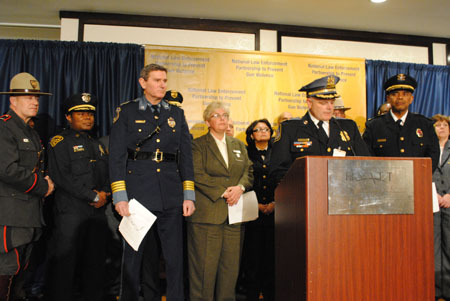WASHINGTON – Police chiefs from Maryland, Virginia, California and Massachusetts demanded that Congress impose more gun controls during a Wednesday press conference at the Hyatt Regency Washington on Capitol Hill.
More than 24 representatives of the National Law Enforcement Partnership to Prevent Gun Violence called on Congress to pass the Assault Weapons Ban introduced by Sen. Dianne Feinstein , D-Calif., and Rep. Carolyn McCarthy, D-NY, that would ban most semi-automatic weapons and high-capacity, ammunition-feeding devices that exceed 10 rounds.
“Reloading can provide the critical window to seek coverage, concealment (and) a moment to escape or, if you’re in a position, to attack your shooter,” Baltimore County Police Chief Jim Johnson said. “It’s a world of difference.”
Those high-capacity magazines, he said, “are not used for hunting, do not belong in our homes and wreak havoc in our communities.”
For John Dixon, the second vice-president of the National Organization of Black Law Enforcement Executives, extending background checks is a “common-sense measure,” and assault weapons are “instruments of carnage.”
“These weapons were designed for war and designed to kill as many people as fast as possible,” he said. “Ten rounds would help reduce the number of senseless deaths in the mass shootings and give law enforcement the opportunity to respond.”
Still, the National Rifle Association’s Institute for Legislative Action argues that banning popular rifles is unconstitutional under the Second Amendment, citing the Supreme Court ruling that a handgun ban is unconstitutional partly because “handguns are the most popular weapon chosen by Americans for self-defense in the home.”
Police officials argued that the Brady Law should extend to all gun sales. Effective in February of 1994, the law established a five-business-day waiting period for law enforcement to run background checks for firearm purchases through federally licensed gun dealers.
Unlike federally-licensed firearm dealers, online and gun show transactions do not require background checks. Johnson estimated that as much as 40 percent of all firearm transactions occur without a background check.
“It’s like allowing 40 percent of people to go through airline security points without a background check. Would we do that as Americans? Well, certainly not,” he said.
A CBS poll conducted in January found that 92 percent of American gun owners approve of universal background checks on all potential gun buyers.
“No policy matter has this much public support,” Dixon said
Johnson rejected the argument that requiring background checks for all firearm purchases would lead to a nationwide registry.
“Records that go to the national instant check system (are) required to be destroyed in 24 hours,” he said. “It would be simply impossible to create a nationwide gun registry.”
Police officials also lobbied Congress to ensure that disqualifying records, especially mental health and substance abuse records, of all prohibited firearms purchasers are current and accurately listed in the National Instant Criminal Background Check System.
Discussion surrounding mental health issues as a disqualifier for gun purchases has intensified since Adam Lanza, who was diagnosed with mental health issues, killed himself and 26 others, including 20 schoolchildren at Sandy Hook Elementary School, in Newtown, Conn., in December.
“The Sandy Hook tragedy was horrific and rightfully shocked the conscience of our country. As public safety officers, we see horrific gun violence in our communities every day. And we are speaking out because this must stop,” Dixon said.
Firearms were the No. 1 cause of death for police officers killed in the line of duty in 2011, according to the National Law Enforcement Officers Memorial Fund.
More than 100, 000 firearm-related injuries and deaths from homicides, suicides and accidental shootings occur each year in the United States, according to a study published by Oxford University Press in 2000.
“Congress must act to end this epidemic of gun violence. The ball is in their court. The safety of our campuses and our nation depends on it,” said Anne Glavin, president of the International Association of Campus Law Enforcement Administrators.
“We clearly are facing a crisis. The time to act is now,” said Vice-President Terry Cunningham of the International Association of Chiefs of Police. “We may never be able to prevent every gun-related tragedy, (but) that has to be our goal.”

